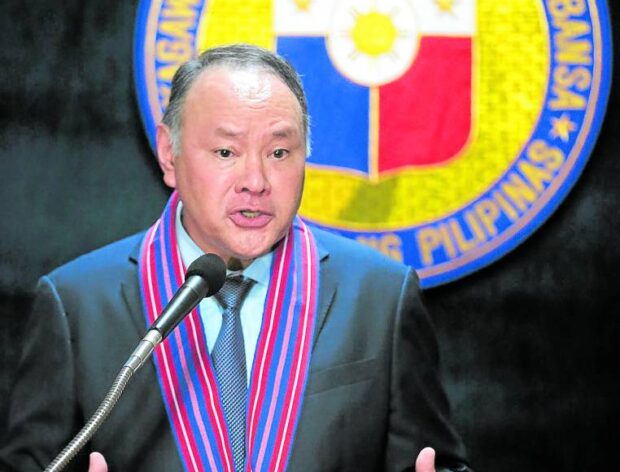MUP pension reform among Teodoro’s priorities as DND chief

Defense Secretary Gilberto Teodoro Jr. (Photo by GRIG C. MONTEGRANDE / Philippine Daily Inquirer)
MANILA, Philippines — Newly appointed Defense Secretary Gilberto Teodoro Jr. on Wednesday said he would focus on the problematic pension program for military and uniformed personnel (MUP) that is feared to lead to a “fiscal collapse” if not resolved anytime soon.
In his first press conference since his appointment, the returning defense chief said that pension reform would be one of his top priorities as ordered by President Marcos.
Teodoro, who was defense secretary under former President Gloria Macapagal-Arroyo from 2007 to 2009 and the first civilian without military background to lead the agency in recent years, said the President tasked him “to find a sustainable MUP pension scheme” by working with Congress and the Armed Forces of the Philippines and follow on the gains so far made by former acting defense chief Carlito Galvez Jr. and Finance Secretary Benjamin Diokno.
Must be ‘self-sustaining’
A Senate bill seeking to reform the MUP retirement scheme is now with a technical working group for discussions, with representatives from the government’s economic team and the uniformed services being consulted on the matter.
“The initial job is to minimize as much as possible the hemorrhage immediately. And then because a self-sustaining pension scheme needs time, we need to build up the funds and we will need to find sources in order to raise capital for the fund … if it will be a fund,” he added.
Article continues after this advertisementDiokno had earlier warned of a potential fiscal crisis due to the “fiscally unsustainable” pension scheme for uniformed personnel, which is currently fully funded by the government without contribution from its members, unlike those of the Government Service Insurance System and the Social Security System that are financed by state and private sector workers and their employers.
Article continues after this advertisementThe current MUP pension system, which covers retirees from the military, police, coast guard, jail guards, and firefighters, has also been eating up the maintenance and other operating expenses and capital outlays of the military in their annual budget.
National Treasurer Rosalia de Leon had said that the unfunded liabilities, which meant no revenue sources have been identified to cover such obligations, of the MUP pension program were estimated at P9.6 trillion as of 2020, prompting current efforts to reform the retirement scheme.
The financial strain on the pension fund worsened when former President Rodrigo Duterte doubled the salary of the armed services in 2018.
Opposition
In the Senate bill, it is proposed that uniformed personnel contribute to their pension fund, and that the provision that automatically sets the amount of pension of a retiree to the salary of the active personnel of the next higher rank be removed.
The proposed changes, however, were met with stiff opposition.
During a Senate hearing on the proposed MUP pension reform bill last month, Galvez told lawmakers that they were anticipating the retirement of “around 70 to 80 percent” of enlisted personnel to avail themselves of the current pension system to secure their benefits.
Asked about the proposal to seek contributions from MUP for the pension system similar to other state workers, Teodoro said he believed there would not be many objections to it.
“I think it’s a truism, if it is participatory, then naturally, the fund becomes sustainable. But that being said, there is no finalized agreement yet as far as I know,” he said.
“But I think that everybody, just as long as they are contributing to the future, or their secured future— it’s just like us, we pay for medical insurance, educational plans and they see perhaps, that their money is going to something that will benefit them in the future–I don’t think there will be [many] objections,” he added.
More funds for upgrade
With his return at the helm of the Department of National Defense [DND], Teodoro said he would also lobby for funds for military modernization in Congress and work on the agency’s reform as some of his other main priorities.
“As a manager, my first job is to manage the whole institution itself. I want to lay the foundations for a (DND) for our future–to develop expertise in program management, analytics, predictions, other capabilities, contracting, international relations and to build up the career track of our own employees,” he pointed out.
“We must remember that this is a civilian department. We are here to support the largest agency, which is the AFP, and the four other agencies under our watch. But then again, in order to manage that, we need to build up the managerial capability of the managing department and that is what I would like to focus my attention on,” he said.